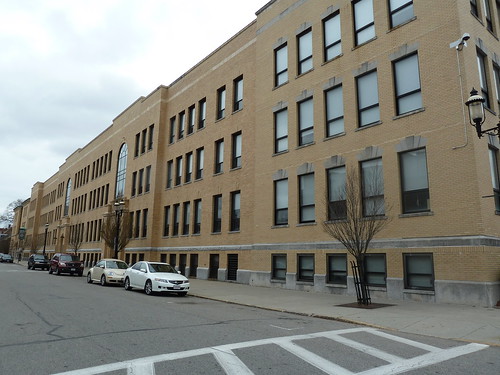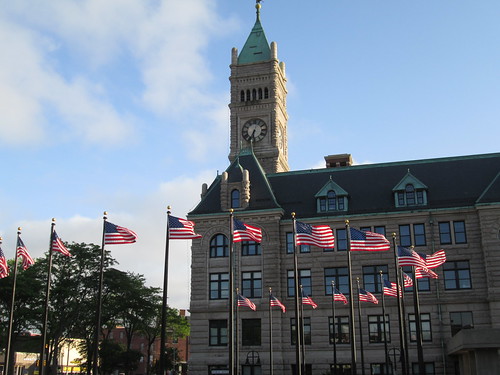Lowell Week in Review: May 28, 2017

Lowell High School 1922 building
New Lowell High School
The new Lowell High School selection process is hurtling towards its June 13, 2017 conclusion. Next Friday’s City Council agenda packet will contain all the cost estimates, reports, and LHS-related motion responses that remain outstanding. On Tuesday, June 6, at the regular city council meeting, the City Manager and the architects/consultants will make a presentation to councilors.
Two things are scheduled to occur on Thursday, June 8. At 10 am, the city’s School Building Committee will meet in the city council chambers to vote on its site/option recommendation. Then at 6:30 pm, also in the council chambers, councilors will host a public forum which will involve presentations and citizen input.
There will be two other public forums prior to the final vote. The first will be Saturday, June 10, at 10 am at the Lowell High Irish Auditorium; the second on Monday, June 12, at 6:30 pm at the Lowell Senior Center.
Then on Tuesday, June 13, 2017, the council will take its final vote on the various options. Procedurally, I’m not sure how that vote will be done. In most council votes, a single item is presented to councilors who vote either yes or no with the side receiving five votes prevailing (although some matters require a two-thirds vote of six councilors). But other times, as when a mayor or city manager is selected, councilors choose from multiple options, casting their votes by naming their preferred choice. This method makes it tougher to get to the needed five votes since there are multiple options for councilors to choose. I believe this will be the method used for casting the votes for the high school with councilors stating their choice of option when called upon.
An interesting procedural twist involves Option 3 which requires the taking of the so-called “dentist office” on Arcand Drive by eminent domain to expand the footprint of the existing downtown site. Unlike most council matters which require five votes to prevail, taking property by eminent domain requires a two-thirds vote of the councilors, meaning six councilors must support it. But while taking the property would require six votes, I believe choosing that option, Option 3, would still take only five votes. That leaves the possibility that Option 3 could become the preferred option of the council by just a bare five vote majority but then would require a sixth councilor – one who had voted for another option – to then support the eminent domain taking to make it work. Otherwise there would be a stalemate that would prevent that option from going forward.
A similar situation occurred way back in 1970 when Jim Sullivan was selected to be Lowell City Manager on a five to four vote of the city council. Sullivan received the votes of Mayor Richard Howe and Councilors John Mahoney, Paul Tsongas, Brendan Fleming, and Armand LeMay. City Auditor Leo Morris received the votes of Councilors Philip Shea, Samuel Pollard, Ellen Sampson, and Leo Farley. But Sullivan had set as a pre-condition of taking the job an increase in the salary (to $25,000 per year plus the use of a city car). Raising the salary required six votes. Had the four who voted for Morris also opposed increasing the pay of the city manager, Sullivan may not have taken the job. However, Phil Shea, even though he had supported another candidate for city manager, chose not to use a procedural maneuver to frustrate the will of the majority and added the necessary sixth vote for the pay increase, and Sullivan became city manager.
Perhaps history could repeat itself on June 13, 2017, with Option 3 prevailing by five votes, with one of the four councilors who preferred another option then joining in at a later time to provide the sixth vote needed for the eminent domain taking.
In any case, councilors might want to get some procedural clarification on this prior to June 13. I think my interpretation that Option 3 would only need five votes to prevail is correct, but it’s not up to me.
FY18 City Budget
Lost amidst all the Lowell High talk is the Fiscal Year 2018 budget for the city of Lowell which will be voted on by the council with a public hearing this coming Tuesday night. The budget proposed by City Manager Murphy is $349,925,167. Councilors can accept the budget as presented or reduce it, but they cannot increase it. A letter from Manager Murphy to Councilors that accompanies the budget points out that this is the fourth budget of the Murphy Administration and that it continues to support the three pillars Murphy identified when he took office as critical to the success of the city: Public safety, education, and economic development.
Regarding public safety, the letter points out that the police department will maintain its current strength of 250 officers and that safety-related investments like a swipe card access system will be made to the current police station. The fire department will maintain 213 fire fighters, and will also purchase two new vehicles as well as new safety gear for fire fighters.
In education, the city will again exceed the minimum state requirement for net school spending, and $1.35mil will be spent on roof repairs to school buildings. The letter also calls the new Lowell High School “a signature project of [the Murphy] administration.”
As for economic development, a designer has been selected for the 900-space parking garage in the Hamilton Canal District and “negotiations [are] underway with multiple parties with interest in the district.”
The Murphy letter also lists some fiscal challenges facing the city including “State assessments beyond the control of the city” (i.e., charter school assessments) and fixed costs that continue to rise despite the city workforce “being as lean as it has ever been.” To offset these increases, the tax levy will rise 1.5 percent, however, Murphy warns that in future years, more significant increases will be needed to help pay for the new high school.
Upcoming City Council Meeting
Other than the public hearing on the budget, the city council has a relatively light agenda this coming Tuesday. There is a motion response that brushes aside last week’s request by Councilor Leahy that the Hamilton Canal District be considered as a site for a new Lowell High School by listing all of the state and federal funding and grants that have already been committed to the HCD for the purpose of economic development. Presumably the council will accept this report with minimum comment. As for council motions, there are just four of them:
- Elliott/C. Leary/C. Samaras – Req. City Council vote to appoint Ad Hoc subcommittee to discuss process of amending City Charter to review and consider adopting a district/at-large council representation form of government and then to make recommendations to the full City Council.
- Samaras – Req. City Mgr. have proper department restripe the road lanes on Industrial Avenue and at merge of Thorndike Street and Gorham Street.
- Milinazzo – Req. City Mgr. update the City Council on the status of restriping Nesmith Street.
- Leahy – Req. City Mgr. be prepared for all responses to inquiries regarding Lowell High School Project at the scheduled presentation meeting before the Council.

Charter Change
That first motion for this Tuesday, by Councilors Elliott, Leary and Samaras, requests that a subcommittee be formed to make recommendations on possible changes to the city’s charter regarding the method of electing city councilors. This motion was presumably prompted by a lawsuit filed two weeks ago by city residents from the Latino and Asian communities that alleges that the current method of electing councilors and school committee members in which all are chosen at-large in a citywide vote, violates the federal Voting Rights Act.
I used to be of the opinion that minority voters could elect members from their respective groups if they just voted in larger numbers. However, my opinion has changed over time, and I have come to believe that the lack of success of minority candidates in citywide elections itself suppresses turnout among those groups. Consequently, I believe that a mixture of at large and district councilors and school committee members, the system in place in almost every other city in Massachusetts, would work best for Lowell.
Changing the current system is a different matter. City councilors sincerely believe that they already represent all residents, and to a large extent they do, but to remain in office, they have to be most responsive, either consciously or subconsciously, to the 10,000 people who vote in city elections. Since those 10,000 voters are not evenly spread among the city’s neighborhoods, or among the many demographic groups (age, race, class, etc.) that reflect all of the 105,000 people living in the city, the system is not truly representative of all residents.
That same dynamic makes it unlikely that any change would occur through the ballot box. The 10,000 people who regularly vote in city elections hold a disproportionately high level of influence on city government. Why would they choose to dilute that influence?
That would leave as options for changing the charter a court-imposed order or settlement, or perhaps a council vote that led to a home rule petition in the legislature.
In any case, I anticipate that this motion will pass, however, I don’t expect much to be done with it until later in the summer, after the June 13, 2017 vote on the future location of Lowell High School. Beyond the work of this subcommittee, the issue of the form our city government takes should also be a big issue in the upcoming city election this fall.
Thanks Dick, your commenrts are always appreciated and helpful.
On the charter issue, one thing I’ve wondered about: can we mix district and at-large council seats and retain the city manager model? That piece has been unclear to me from looking at the other Plans, F in particular.
Worcester is a City Manager form of government, but the city council consists of 6 at large councilors and 5 district councilors. The mayor is the at large councilor with the most votes (unless previously removing himself from that consideration).